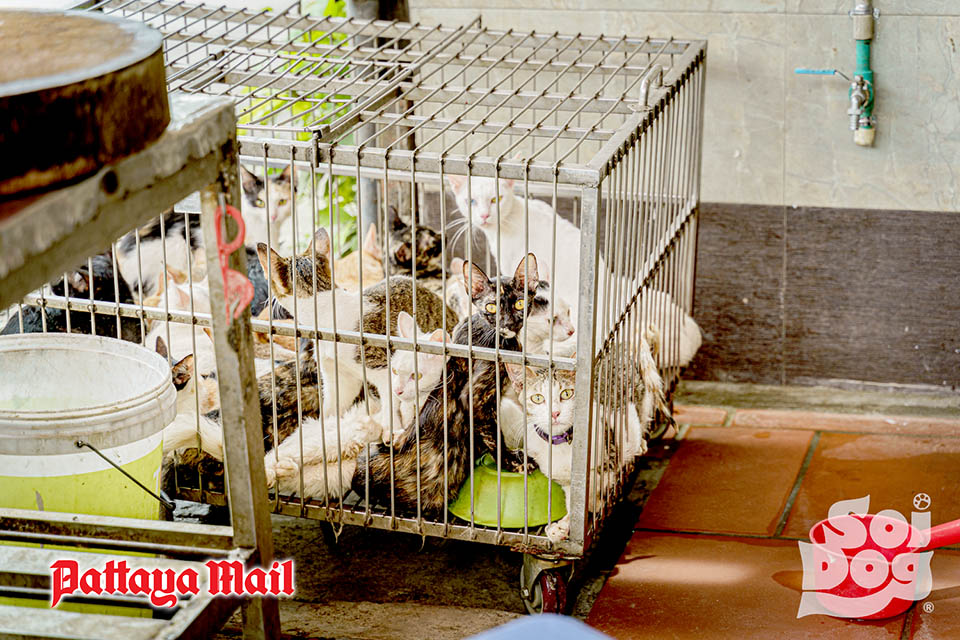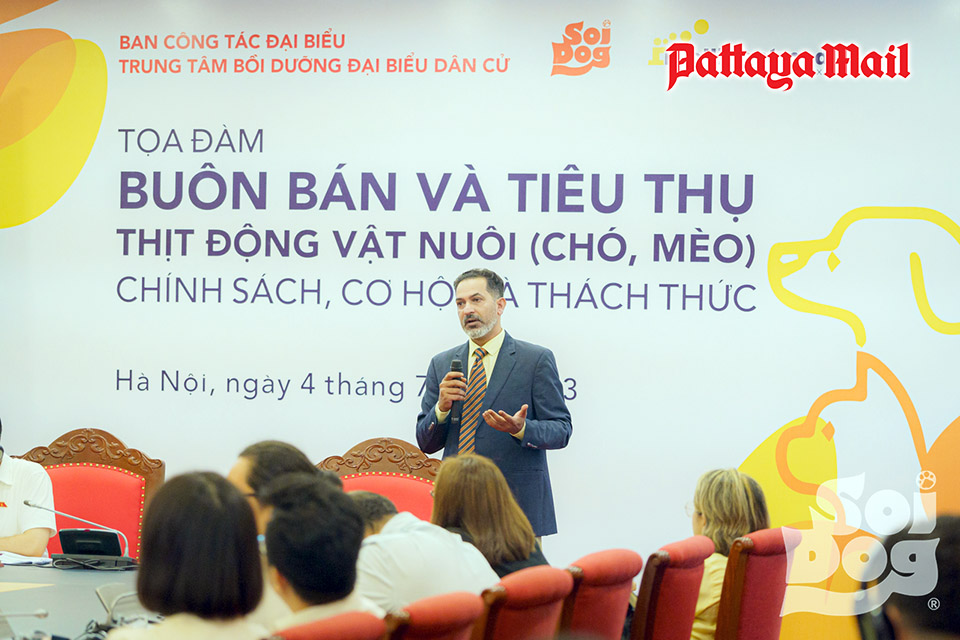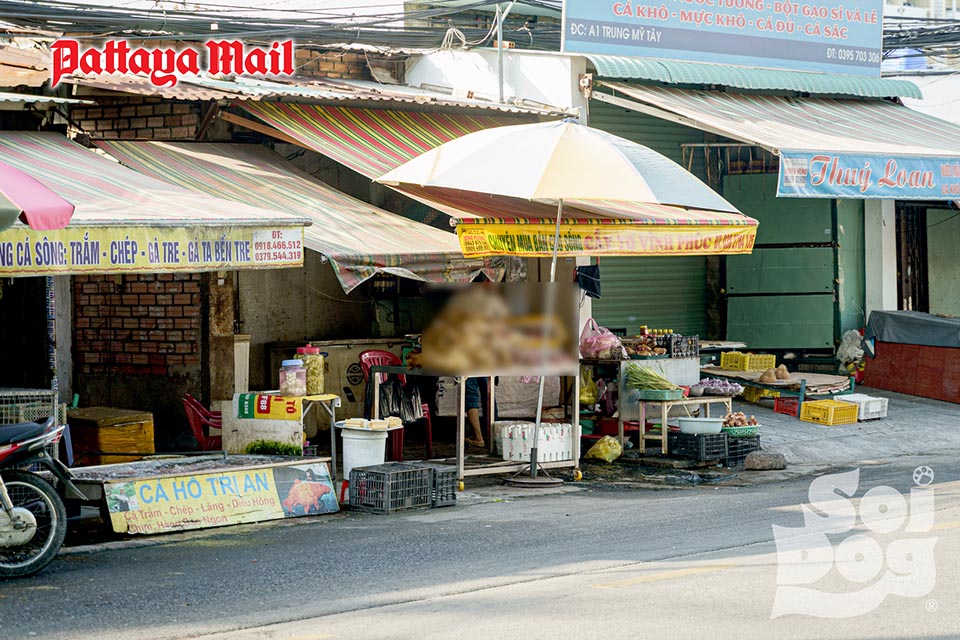
Ho Chi Minh, Vietnam – A roundtable discussion aimed at combatting the consumption and trade of dog and cat meat was convened by Soi Dog Foundation International and Social and Behavior Change Science Agency Intelligentmedia with the National Assembly of Viet Nam on July 4. The event brought together nearly 50 parliamentarians, government officials, and specialists from across Vietnamese society to tackle this serious and urgent issue.
An estimated five million dogs and one million cats are brutally killed for meat per year in Viet Nam. The World Health Organization warns that the trade, slaughter and consumption of these animals pose public health risks, including from trichinellosis, cholera and particularly the deadly rabies virus which still kills approximately 70 people each year in Viet Nam. Despite the increasing number of citizens fighting to end this practice, some groups still consider dog and cat meat a delicacy which motivates traders to continue operating.
The discussions encouraged a more comprehensive understanding of the dog and cat meat trade in Viet Nam, the efforts of various authorities and ministries around pet management and associated legal frameworks.
Mr Nguyen Tuan Anh, Vice Chairman of Board of The Deputy Affairs (under Standing Committee of The National Assembly), said: “Dog and cat meat trade and consumption are increasingly burning issues. Animal welfare has been of the National Assembly’s supervisory sector. Viet Nam has a comprehensive legal framework on the issue, but enforcement is the major loophole. This must be enhanced at all levels in the short term. In addition, targeted communication campaigns should be amplified so that involved actors realise that strengthening welfare standards not only improves the lives of animals but can also educate the public about the zoonotic disease risks that they might face. More than that, the reputation of the nation in an increasingly “greener” planet. I support innovative and impactful initiatives to reduce and stop the trade and consumption of dog and cat meat in Viet Nam.”

One prominent conversation revolved around the strategy and roadmap for developing Hanoi as a dog and cat meat-free city. Mr. Ta Van Tuong, Vice Director of Hanoi Department of Agriculture, said: “Being the cultural heart of Viet Nam, it’s critical for Hanoi – the country’s capital – to maintain its prestige as a cultural-based, civilized and dynamic city. Phasing out dog and cat meat is key to attracting more tourists who are increasingly caring for environmental tourism services and animal welfare conditions. The risk of rabies is obvious if dog control and vaccination is not properly enforced. In the short term, Hanoi should adopt anti-rabies measures, establish safety zones for vaccinated dogs and strictly control the trade and consumption of dog and cat meat. Additionally, local authorities should work hard to increase education, public awareness, control of unleashed dogs and enhance animal welfare regulations and settle violations. It contributes to creating the image of the modern and civilized city.”
Thailand-based animal welfare organisation Soi Dog Foundation International, who are fighting for an end to the dog and cat meat trade across Asia, led a discussion around evidence-based research on the link between animal-directed violence and its adverse impacts on human beings. The survey investigated how workers in the trade are motivated and what consequences they might have suffered as a result of their involvement, including emotional distress, anxiety, depression and other symptoms akin to post-traumatic stress disorder. Physical injuries and infectious diseases should also be given due consideration.

Mr. Rahul Sehgal, Director of International Advocacy at Soi Dog Foundation International, said: “The ultimate goal is a ban, initially at the provincial level like with Hanoi Capital, on the trade and slaughter of dogs and cats and their consumption. The partnership with the National Assembly has marked a critical milestone in raising the profile of the issue to the top of government so that laws and regulations to control the dog and cat meat trade will be further improved and enforced. We are also committed to supporting the authorities, civil society associations and other relevant stakeholders to adopt a thoughtful and multi-faceted approach which will include education, legislation, promoting alternatives, cultural change and collaboration leading to a zero-tolerance attitude against dog and cat meat consumption.”
As dog and cat meat consumption is deeply rooted, public education and raising awareness should be at the forefront of tackling the issue. In the long run, an evidenced-based, comprehensive and targeted social and behavioral change initiative should be employed to initiate and sustain a change of practice.

Ms. Duyen Bui, Social and Behavior Change Director of Intelligentmedia, said: “Apart from legislation improvement and increased enforcement, behavioral science should be utilised to alter the habit, especially of high-frequency dog and cat meat consumers. It necessitates in-depth understanding and proper segmenting of the user groups, the creation of barriers and restrictions, and education on alternatives. Interventions not only involve the target audiences but also their closed network and the whole community so that public scrutiny and the social norm against consumption will be kicked off and maintained. Ultimately, it will put the practice to an end.” Lessons can also be learned from countries where a ban on dog and cat meat already exists, such as Thailand and the Philippines.
The event closed with a strong consensus from parliamentarians and leaders from the Ministry of Agriculture and Rural Development, the Ministry of Health, the Ministry of Public Security, the Ministry of Trade and the Ministry of Culture, Sport and Tourism that ending the consumption and trade of dog and cat meat is necessary for the sake of animal welfare compliance, public health and safety and the country’s image.






